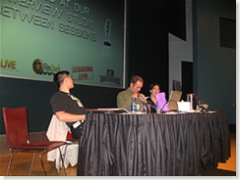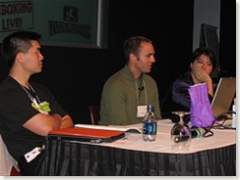 Over 50 Toronto area social media types gathered at The Pour House for the first Third Tuesday meetup. The room was full of bloggers and podcasters, including: Ed Lee, Michael Seaton, Chris Clarke, Josceln Smith, Mary Ellen Armstrong, Donna Papacosta, Lisa Walker, Douglas Walker, Tamera Kremer, David Jones, Julie Rusciolelli, Michael O’Connor Clarke, Jeremy Wright, Leona Hobbs and Terry Fallis.
Over 50 Toronto area social media types gathered at The Pour House for the first Third Tuesday meetup. The room was full of bloggers and podcasters, including: Ed Lee, Michael Seaton, Chris Clarke, Josceln Smith, Mary Ellen Armstrong, Donna Papacosta, Lisa Walker, Douglas Walker, Tamera Kremer, David Jones, Julie Rusciolelli, Michael O’Connor Clarke, Jeremy Wright, Leona Hobbs and Terry Fallis.
The attendees were treated to a great interactive session with Shel Israel and Canadian blogger/business journalist, Mark Evans.
 Mark kicked off the session by telling the story about Shel’s previous trip to Toronto. Apparently Shel didn’t bring his passport on the trip. A problem when he reached Canadian Immigration. Undeterred, Shel produced a copy of Naked Conversations and pointed to his picture on the cover and said, “See, this is me.” Happily, the Canadina immigration officer conformed to the polite and obliging Canadian stereotype and admitted Shel on the basis of his book cover credentials!
Mark kicked off the session by telling the story about Shel’s previous trip to Toronto. Apparently Shel didn’t bring his passport on the trip. A problem when he reached Canadian Immigration. Undeterred, Shel produced a copy of Naked Conversations and pointed to his picture on the cover and said, “See, this is me.” Happily, the Canadina immigration officer conformed to the polite and obliging Canadian stereotype and admitted Shel on the basis of his book cover credentials!
Shel brought his passport on this trip.
Then Mark and Shel kicked into a full Monty Naked Conversation.
Mark: “So what about the next book, Global Neighbourhoods?”
Shel: “As I was sitting in Silicon Valley, which had once been seen as the centre of everything, doing interviews for Naked Conversations, I realized that a lot of what was most important was occurring on the edges. No longer was it necessary to move to Silicon Valley to be close to the action.”
 Mark: “How about virtual worlds? Where does that fit into your vision of social networking?”
Mark: “How about virtual worlds? Where does that fit into your vision of social networking?”
Shel: “There’s a line from Virginia Woolf about Truth or Illusion – how do you tell the difference? Many people are fascinated by Second World. Some people express themselves better in this kind of environment. And people should do what they feel comfortable doing.”
Mark: “I took three weeks off work this summer and read your book. 😉 I look around me in Canada and I don’t see much corporate blogging. Is it happening in the way you expected?”
Shel: “No, the adoption is going more slowly than we thought it would. But it is accelerating. Since January of this year, it’s gone from three of the Fortune 500 companies to about 30. Corporations are doing what they do. They are being cautious and risk avoidant. They are meeting and talking about whether they should be doing it. And then they are dipping their toes into the water. Then their ankles.”
“For years, corporations have been going the other way. It takes them time to reverse course. And that’s what many of them need to do. I worked with Wells Fargo. At first, they sucked. But they got better. It took them three months. But they improved.”
Dave Forde: “Now that Robert Scoble has left Microsoft, has the tone of his blog changed?”
Shel: “Robert’s a lot happier since he left Microsoft. He’s now doing what he loves. And the passion is coming out in his blog.”
Mark: “When Scoble left Microsoft, I thought his profile might decline.”
Shel: “That didn’t happen. And the other thing that didn’t happen is that Microsoft didn’t go back to being the Borg.”
Audience Question: “Whose blogs tend to be shining examples of good corporate blogs?”
Shel: “What is really wonderful about the blogosphere is that you can go out and find the blogs that YOU like. For me, the number one issue for most corporate blogs is that they are boring as hell. If you learn anything, listen closely, because the people who talk back to you are the people who can really teach you something.”
Michael O’Connor Clarke: “Is there such a thing as a corporate blog? Companies don’t blog. People blog. “
 Shel: “Microsoft broke ground by hiring Scoble knowing that he would blog when he got there. Robert was hired by people who knew that he would shake things up, that he would speak out. Maybe they didn’t know that he would speak out against Ballmer’s position on gay rights. But they didn’t do anything to him when he did speak out.”
Shel: “Microsoft broke ground by hiring Scoble knowing that he would blog when he got there. Robert was hired by people who knew that he would shake things up, that he would speak out. Maybe they didn’t know that he would speak out against Ballmer’s position on gay rights. But they didn’t do anything to him when he did speak out.”
Audience question: “How about companies that start to blog when they are in crisis cycle, such as Dell and Ford?”
Shel: “While Dell started out poorly and made some mistakes. But since they launched the blog, they’ve committed an extra $100 million to improve customer service. They handled the battery situation well. Unlike Sony, who have been quiet about the fact that it was their batteries. And who have yet to engage with consumers on the problems with their product.”
“Looking at Ford, they are a company that has done a lot of
things wrong for a long time. And a hundred blogs won’t help them.”
Mark: What’s your take on podcasts and video casts?”
Shel: “When we wrote Naked Conversations a year ago, podcasting was very small. Social media is now getting bigger than blogging itself. Some people are comfortable with text. Many corporations are more comfortable with audio and video because they have a greater sense of control. That’s great, because this will soon become much more interactive.”
Audience question: “One of the things that companies are spending money on is monitoring the conversation and identifying influencers. What do you think makes one person more influential?”
Shel: “Four years ago, a blogger named E.A. Spouse posted about her husband’s working conditions at Electronic Arts. One of the readers was Scoble. He picked it up. It was amplified quickly and appeared in mainstream media.
“At the time of the London subway bombing, the BBC learned of the bombing from a person who captured images on his cell phone.
“Metcalfe’s law states that the network becomes more powerful the greater the number of nodes in the network. In blogging, we are the nodes.
“So, anyone who is blogging can become very influential.”
“The tipping point has been reached. Blogging is.”
Much conversing. Much networking. A GREAT way to launch Third Tuesday.


 Dave Forde is conducting a survey of Canadian corporate bloggers perceptions of blogging and how it fits into their communication and marketing strategies. He’ll be publishing the results on his blog.
Dave Forde is conducting a survey of Canadian corporate bloggers perceptions of blogging and how it fits into their communication and marketing strategies. He’ll be publishing the results on his blog.






 Shel Israel
Shel Israel








 Public relations is an industry that is populated predominantly by women – at this year’s PRSA Counselors Academy, one presenter suggested that approximately 70% of PR practitioners are female.
Public relations is an industry that is populated predominantly by women – at this year’s PRSA Counselors Academy, one presenter suggested that approximately 70% of PR practitioners are female.